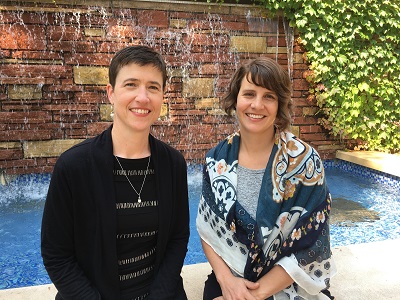
Two researchers in the School of Social Work have been awarded $18,345 in pilot grant funds through the Colorado School of Public Health’s Graduate Program in Public Health Research.
Rebecca Orsi, research scientist in the Social Work Research Center, and Paula Yuma, assistant professor in the School of Social Work and faculty member in the area of global health and health disparities in the Colorado School of Public Health, are using the funding to search for answers to the question of whether access to care protects children at risk for maltreatment.
“We were thinking about the possible repeal of the Affordable Care Act, and wondering how much impact losing access to care could have on communities,” said Yuma. “We are especially concerned with what that could mean for child maltreatment.”
“The opioid crisis makes this even more relevant,” added Orsi. “Access to care for substance abuse treatment is a huge issue. We actually will be able to count facilities with access to substance use treatment programs.”
Their research proposal is entitled “Does Access to Care Protect Children at Risk for Maltreatment? An Ecological Study of United States Counties across the Urban-Rural Continuum.”
Using existing data to draw deeper insights
Starting with indicators of maltreatment aggregated by the U.S. Department of Health and Human Services and stored at Cornell University, Orsi and Yuma will also leverage other existing resources to explore indicators of care from a social-ecological perspective.
“This gives us a chance to look much bigger,” Orsi said. “We’re using a data set that contains counts of child maltreatment reports for every county in the country for fiscal year 2015.”
“We do population-based research,” said Orsi. “A big part of that is looking to see what kinds of data sources are out there that are nationwide, and then say, ‘how can we harness the power of computing and linking to put them all together in one place?’”
”We recognize that people don’t exist in isolation,” said Yuma. “We want to learn: what things are happening at the county level that contribute to maltreatment?”
Connecting child maltreatment to environmental factors
The data analysis will allow the researchers to explore child maltreatment as it relates to communities. “We’re looking at how many primary care providers there are, what kind of insurance people have, what physical resources exist in their county, as well as access to substance abuse treatment and mental health care,” said Yuma.
“Are there other factors like affordability, which measures economic stress?” added Orsi. “Are people living in a situation where it’s possible to afford the things they need? Or are they really struggling?”
Following the analysis of risk factors as they relate to child maltreatment, the researchers will explore whether access to healthcare helps to reduce the impact of risk. For example, “Will we see substance abuse is not as much of a risk factor if people have access to care in their community?” said Orsi.
“We are especially concerned with these circumstances in rural communities,” added Yuma. “Many rural facilities are on the verge of closing. They’re not financially sustainable because population is smaller, and insured rates are low in the communities they serve. What happens when they disappear?”
Impacting policy in Colorado and beyond
Ultimately, the researchers hope to impact policy discussions about healthcare at both state and federal levels, whether or not the Affordable Care Act stays in place.
“States can make funding decisions which relate to access to healthcare,” said Orsi. “If access to treatment can interrupt an opioid addiction which might put a child at risk for neglect, it’s a positive gain for families and for community public health.”
“America is facing two crises of vital importance to the health of the nation’s children: substance abuse and mental health,” said Yuma. “We think access to care will reduce the effects of these risk factors on child maltreatment, and we expect access to care is an even more crucial protective factor for children in rural areas.”
The School of Social Work is part of CSU’s College of Health and Human Sciences.